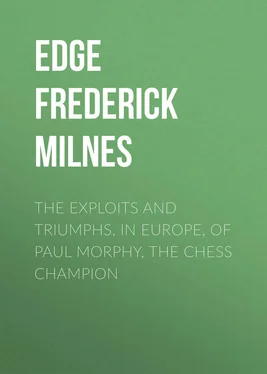Frederick Edge - The Exploits and Triumphs, in Europe, of Paul Morphy, the Chess Champion
Здесь есть возможность читать онлайн «Frederick Edge - The Exploits and Triumphs, in Europe, of Paul Morphy, the Chess Champion» — ознакомительный отрывок электронной книги совершенно бесплатно, а после прочтения отрывка купить полную версию. В некоторых случаях можно слушать аудио, скачать через торрент в формате fb2 и присутствует краткое содержание. Жанр: Развлечения, foreign_antique, foreign_prose, на английском языке. Описание произведения, (предисловие) а так же отзывы посетителей доступны на портале библиотеки ЛибКат.
- Название:The Exploits and Triumphs, in Europe, of Paul Morphy, the Chess Champion
- Автор:
- Жанр:
- Год:неизвестен
- ISBN:нет данных
- Рейтинг книги:4 / 5. Голосов: 1
-
Избранное:Добавить в избранное
- Отзывы:
-
Ваша оценка:
- 80
- 1
- 2
- 3
- 4
- 5
The Exploits and Triumphs, in Europe, of Paul Morphy, the Chess Champion: краткое содержание, описание и аннотация
Предлагаем к чтению аннотацию, описание, краткое содержание или предисловие (зависит от того, что написал сам автор книги «The Exploits and Triumphs, in Europe, of Paul Morphy, the Chess Champion»). Если вы не нашли необходимую информацию о книге — напишите в комментариях, мы постараемся отыскать её.
The Exploits and Triumphs, in Europe, of Paul Morphy, the Chess Champion — читать онлайн ознакомительный отрывок
Ниже представлен текст книги, разбитый по страницам. Система сохранения места последней прочитанной страницы, позволяет с удобством читать онлайн бесплатно книгу «The Exploits and Triumphs, in Europe, of Paul Morphy, the Chess Champion», без необходимости каждый раз заново искать на чём Вы остановились. Поставьте закладку, и сможете в любой момент перейти на страницу, на которой закончили чтение.
Интервал:
Закладка:
Philidor certainly did much for chess, particularly in England. He possessed peculiar advantages for so doing. In the first place he had true talent; his powers for playing blindfold excited extraordinary interest at the time, not merely amongst chess players, but especially with the titled crowd. His political antecedents increased the general interest, and, last and best of all, he was a foreigner. If Philidor had been an Englishman he would hardly have sold a copy of his book.
Philidor organized a chess club in London, which met at Parsloe's Coffee House, St. James street. At the present day little is known of that early association, and we cannot even tell whether the members were numerous. After his death, chess seems to have languished; Parsloe's club dragged on its existence during some years, dying from inanition about 1825. The London Chess Club, first organized in 1807, kept alive the sacred fire; but that was the only community in England during the first quarter of this century where the game was publicly played. Some years after the establishment of the London, the Edinburgh Chess Club started into existence. In 1833, a great impetus was given to the game by the commencement of a weekly chess article in the columns of "Bell's Life in London." Amateurs now had an organ which could record their achievements; men hitherto unknown beyond their private circles felt, that the opportunity was afforded them to become famous throughout the country, and provincial clubs started up here and there. Chess players cannot but regard that paper as a very nursing mother for Caïssa, and certainly never hear it mentioned but their thoughts revert to the veteran – George Walker. I once heard that gentleman relate the following anecdote as a proof of how little was known of chess, in England, previous to the year 1833.
Travelling towards the north somewhere about that period, he put up one night at a hotel in Stratford-upon-Avon. Now any man with music or poetry in his soul, would, under such circumstances, wander towards the home of Shakspeare, or to his last resting-place; provided always that fear of rheumatism, or influenza, did not render him regardful of the rain which then fell "like cats and dogs." How to pass the evening was the question. Only one other traveller in the coffee-room, and he as uncommunicative as Englishmen proverbially are. Mr. Walker did not feel like going to bed at seven o'clock in the evening, and the idea of throwing out "a feeler" struck him as interesting. "Did Traveller play chess?" Traveller did. "Would he have a game?" Yes, he would. The waiter is thereupon summoned, and ordered to bring in a set of chessmen. Waiter, strongly suspicious that Mr. Walker means skittles, finally awaked to consciousness, and, with a smile of triumph, produces a backgammon board.
The very idea of an opponent obliterated all fear of the weather in Mr. Walker's breast, and he sallied forth in quest of the desired pieces. Toyshops, libraries, etc., were entered, but the proprietors scarcely understood what was asked of them, and Mr. W. finally returned to the inn to dispatch "Boots" to the solicitor, doctor, and neighboring gentry – but all to no purpose. Thereupon mine host suggested a note to the parson, but that individual having just rendered himself famous for all time by cutting down Shakspeare's mulberry tree, Mr. Walker replied that such a man could not possibly know anything of the game, and it would be useless to send to him. So the two travellers were forced to console themselves with the intricacies of draughts.
After the death of Philidor, the strongest players were Sarratt, De Bourblanc, Lewis and Parkinson. Sarratt and Mr. Lewis may be looked upon as chess professors. We all know the story of the former's playing with the great Napoleon, and the struggle between pride and courtesy (very silly courtesy, indeed!) finally overcome by Sarratt's drawing every game. This could not have been a satisfactory result to the "Little Corporal," for he never seemed partial to leaving things in statu quo ante bellum . Sarratt was a schoolmaster, Parkinson an architect, and Mr. Lewis commenced life as a merchant's clerk, and eventually embarked in the manufacture of piano fortes. This information has nothing whatever to do with the reputation of the above gentlemen, as successors of Philidor, and I only mention it because chess players, like other men, are not adverse to hearing what does not concern them.
The continental blockade and long wars with Napoleon, isolated England from the rest of the world, and completed the decay and fall of chess for a time. But the game did not languish in France and Germany. About 1820, the Holy Alliance (of Sovereigns against the people) began playing its pranks: proscribed fugitives, martyrs to liberty — soi disant and otherwise – came over to England in shoals, and amongst them were to be found thorough adepts in the mysteries of chess. These refugees rekindled the fire in Britain. They brought with them new and unknown German and Italian works, and made Englishmen acquainted with far more extended information than could be found in Philidor's meagre work.
Before we enter on the new era of chess, I may add for the benefit of such of my readers as are not "up" in its history, that Lewis was the pupil of Sarratt, and McDonnel the pupil of Lewis. It is difficult, from the paucity of existing data , to judge of the strength of former players as compared with modern examples. Mr. Lewis had been accustomed at one time to give McDonnel pawn and two; but, when these odds became too heavy, he declined playing longer, and may be considered to have retired from the arena. Mr. Walker thinks that, in their best play, Messrs. Sarratt and Lewis were a pawn below Morphy, and he ranks the latter with Labourdonnais and McDonnel, stating his belief that the two latter would have played up to a much higher standard if provoked by defeat. For my own part, I think it is indisputable that the reputation of these two players is, at this day, entirely based on their eighty published games, and when Herr Löwenthal's much looked-for collection of Morphy's contests is published, we shall then be enabled to judge of the American's strength, as compared with those celebrated masters.
The influx of foreigners into London was introductory to the establishment of numerous chess circles in different coffee houses. Hundreds of "exiled patriots," bearded Poles and Italians, congregated together to smoke and play chess, and soon infused a general passion for the game amongst the Londoners. The first room specially devoted to chess, of which we have any account, was one opened by Mr. Gliddon, and this led to the establishment of the London Chess Divan.
What chess player has not heard of the far-famed resort of the devotees of Caïssa? The Café de la Régence may be the Mecca of chess, but the Divan is indisputably its Medina. Chess Clubs have risen and fallen, and the fortunes of the survivors have waxed or waned; but the Divan flourishes in spring-tide glory, the Forum Romanum for players of every clime and strength. Now my readers must not suppose that I am about to attempt a history of the "Divan in the Strand," as the Cockneys call it; for I should then have to write the history of modern European chess. I merely intend a sketch, from which they will learn with how much reverence that classic spot is to be regarded.
Somewhere about the year 1820, a tobacconist, named Gliddon, opened a room in the rear of his shop, King Street, Covent Garden, which he fitted up in Oriental style, and supplied with papers, chess periodicals and chess-boards, calling the establishment "Gliddon's Divan." Amongst his patrons was a Mr. Bernhard Ries, who soon perceived that there was room in London for a similar undertaking on a much larger scale. He accordingly opened a grand chess saloon in the building now occupied by the Divan. This was so far back as 1828. It was, at first, on the ground-floor, in the room known as Simpson's Restaurant, but when Mr. Ries gave up the establishment to his brother, the present proprietor, in 1836, that gentleman transferred the Divan to the vast saloon up stairs. In 1838, Mr. Ries (No. 2) found the Westminster Chess Club suffering from paralysis, its sinews (of war) being grievously affected. He purchased the good-will and furniture of the club, giving the members private rooms on the first floor of his house for their exclusive use. The boards and men now in use at the Divan were made expressly for the Westminster Club when first established. The members in their new locale soon found that whilst some twenty boards would be going in the public room, the game languished with them; and in the course of two years the club broke up and became absorbed in the Divan. This will invariably be the case when a private and exclusive chess association holds its meetings contiguous to a public resort devoted to the same game. During the past year, the Paris Cercle des Echecs , which met in rooms over the Café de la Régence, found that the influence of the arena down stairs was too great for them, and they broke up their meetings, and are now to be found en masse in the public café.
Читать дальшеИнтервал:
Закладка:
Похожие книги на «The Exploits and Triumphs, in Europe, of Paul Morphy, the Chess Champion»
Представляем Вашему вниманию похожие книги на «The Exploits and Triumphs, in Europe, of Paul Morphy, the Chess Champion» списком для выбора. Мы отобрали схожую по названию и смыслу литературу в надежде предоставить читателям больше вариантов отыскать новые, интересные, ещё непрочитанные произведения.
Обсуждение, отзывы о книге «The Exploits and Triumphs, in Europe, of Paul Morphy, the Chess Champion» и просто собственные мнения читателей. Оставьте ваши комментарии, напишите, что Вы думаете о произведении, его смысле или главных героях. Укажите что конкретно понравилось, а что нет, и почему Вы так считаете.












